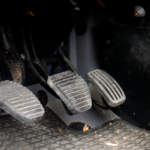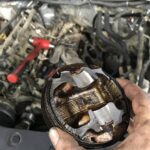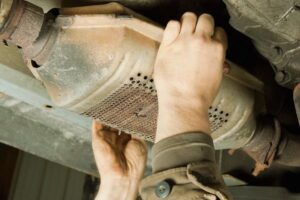If you need to press your brake pedal to the floor to stop your vehicle, it needs to be fixed as soon as possible. What are the possible causes and solutions when the brake pedal goes to floor when the engine is running?
The most common cause of the brake pedal going to the floor when the engine is running is the loss of brake fluid. This fluid maintains the pressure or force required to deliver the braking power to the brake pads on the wheels.
Holes or cracks on the brake fluid line can allow brake fluid to escape; thus, no pressure will be delivered when you press the brake pedal.
You don’t have to floor the brake pedal to stop your car. If you find that you can only stop your car when you hit the brake pedal to the floor, there is a problem. It could be a malfunctioning brake power booster or the master cylinder itself. There are other causes of this problem that you also need to know.
In this article, we will look at 6 possible causes of this brake issue:
- Brake Line or Brake Caliper Leaks
- Malfunctioning Master Cylinder
- Air in the Brake Line
- Malfunctioning Brake Booster
- Your Style of Driving
- Lack of Brake Fluid
We will also look at 4 possible solutions for this brake issue:
- Check the Brake Fluid Level in the Can
- Check the Brake Lines
- Check the Brake Calipers
- Check the Brake Master Cylinder
Read on to learn more about why the brake pedal goes to the floor when the engine is running and how to fix this problem.
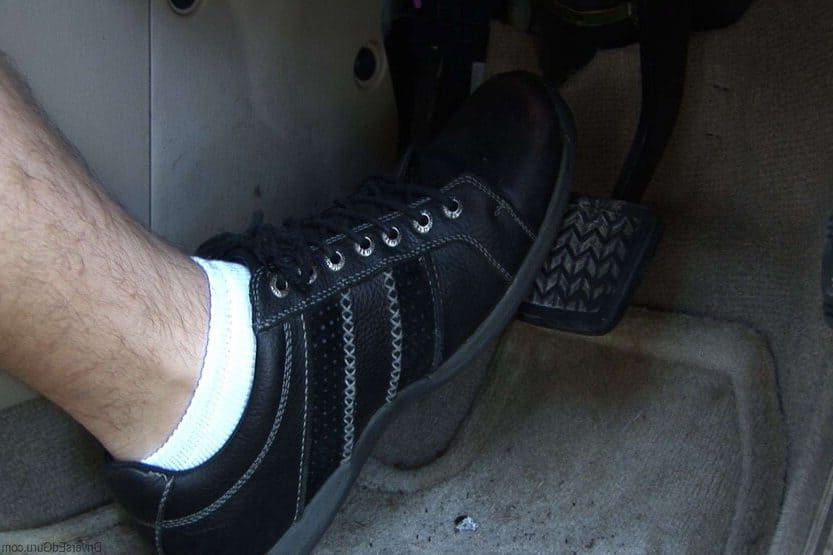
Brake Pedal Goes to Floor When Engine Running
The most common cause of the brake pedal going to the floor when the engine is running is the loss of brake fluid. To solve this problem, any holes or cracks in the brake fluid line need to be sealed.
If the car’s braking system has no problems, the moment you lightly depress the brake pedal, your car should slow down slightly. If you apply strong enough pressure to the pedal, you will drastically reduce the car’s speed. But if you really exert maximum pressure on the brake pedal, the car should stop immediately.
So when you are already stepping on the brake pedal with full force, and still the car doesn’t stop, for sure, there is a problem in your car’s braking system. It can be one or a few other things since braking problems can have many causes.
If there are some leaks in the brake fluid line or any braking system components, your car will lose a certain amount of the required braking pressure. But if there are no leaks and the brake pedal goes to the floor sometimes, there might be a vacuum leakage in the brake booster or master cylinder.
There are still other causes of this problem. Fortunately, problems or issues in a car’s braking system are not very hard to diagnose. There are not many parts that concern the car’s braking system, so you or a car mechanic can fix it easily if any problems arise.
Possible Causes of the Brake Pedal Going to the Floor
Technically speaking, there are only two main causes when your brake pedal goes all the way to the floor: brake fluid leaks and malfunctioning master cylinder. However, there are other causes that you also need to be aware of, just in case these two main causes are not the culprits. So, let’s discuss them one by one.
1. Brake Line or Brake Caliper Leaks
Brake fluid leaks coming from the brake fluid line or brake calipers are the usual cause of brake power loss. There should be enough amount of brake fluid in the system to enable the braking system to provide enough braking power when it is needed.
As your foot press on the brake pedal, the piston in the brake cylinder is compressed. The compression will increase the pressure in the brake lines. This will induce the brake fluid to move to the brake caliper. Because of the brake fluid’s high pressure, the brake pads will move and squeeze into the brake rotor.
There will be friction in these components, and it will cause the vehicle to stop. If there is any leak in the brake line, no pressure will be available in the brake pedal. So, if you step on the pedal, it will just go straight to the floor without you feeling anything.
Since you are always stepping on the brakes every time you drive your car, you should also have enough brake fluid in your system to deliver the braking pressure whenever it is required.
2. Malfunctioning Master Cylinder
The master cylinder is where the process of increasing the brake fluid pressure is accomplished. If the master cylinder is not working properly, braking pressure is reduced or worse. The brake pedal goes to floor but still stops, or they may never work at all. A defective master cylinder will allow the brake fluid to bypass seals internally.
If there is no problem with your braking system, the brake pedal will be firm when you step on it due to its connection to the master cylinder using the pushrod. This cylinder produces hydraulic pressure to activate the brakes on the wheels. It is the one that pushes brake fluid to the four wheels.
This cylinder should be completely sealed so that it can maintain the required braking power or pressure. The master cylinder has rubber seals that prevent the brake fluid from leaking out. If these seals are worn out, damaged, or already old, they will allow the brake fluid to escape or leak. You will have a spongy brake pedal when this happens, and your car will lose its braking power.
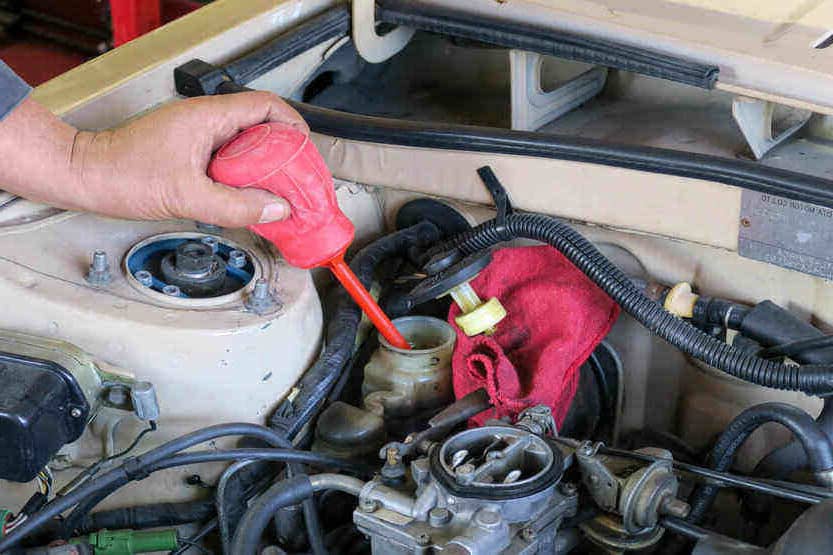
3. Air in the Brake Line
Some drivers have experienced this issue: the brake pedal goes to floor sometimes, after replacing their cars’ master cylinders. This usually happens when air bleeding is not done after a new master cylinder is installed. Some amount of air will still be present if the air is not bled out of the cylinder.
Air will impede the brake fluid flow inside the brake line, giving a feeling of sponginess instead of firmness to the brake pedal. This condition may also lead to eventual damage to the brake line.
4. Malfunctioning Brake Booster
If the brake booster is not working properly, this can cause your brake pedal’s spongy condition. This brake booster’s function assists in the delivery of braking power as you depress the brake pedal.
If it is in good condition, you don’t have to put too much foot pressure on the brake pedal to stop your car. This braking system component is usually located between the brake pedal and the master cylinder, ultimately connected to the engine.
It has a vacuum line which it uses to overcome fluid pressure coming from the braking system. If you observed that your stopping distance has increased, a faulty brake booster could be the culprit. There is not enough power-boosting from the brake booster to help your car stop normally.
5. Your Style of Driving
Your driving style may also be one reason your brake pedal goes to the floor whenever you stop your car. The more you use your brakes, the hotter the brake fluid becomes. If the brake fluid is always hot, it will affect its designed density.
In other words, it will become thinner. The thinner a brake fluid is, the lesser its efficiency is in delivering the required braking pressure. It will require more force or pressure to deliver the required braking power to the brake pads.
So your car’s braking system will not be able to deliver the required power. Even if you floor the brake pedal, the braking power will still be lacking. Riding the brakes can cause this condition. Forgetting to release the parking brake is another culprit.
6. Lack of Brake Fluid
One of the things you should check in your car is the brake fluid level on the brake fluid plastic can or canister. This is an everyday task for every motor vehicle driver. Not enough brake fluid in the container can cause loss of braking power too.
So we’ve looked at why the brake pedal goes to floor when engine running; and also, why the brake pedal goes to floor but still stops the car; Next, let’s look at how to check and fix a soft or spongy brake pedal when your car is running.
Possible Solutions of the Brake Pedal Going to the Floor
Thankfully, the problem of the brake pedal going down to the floor sometimes or all the time is not that difficult to solve. The reason is that there are not too many variables, and not too many car parts are involved. Correctly pointing out the problem is the key to the solution.
1. Check the Brake Fluid Level in the Can
Since the most common cause of this problem is leaking brake lines, this should be the first thing that you should examine. Check the brake fluid level in its plastic container. Is the level considerably lower than normal? If it is, then the leak is located somewhere.
2. Check the Brake Lines
You should next check the brake lines and the brake calipers. Check the car’s four wheels and see any oil residues in any one of them. You may need to detach the tires to do this. Then trace the brake fluid lines and see if there are holes or cuts in them.
If there are traces of oil or oil residues in a line, the leak occurs. Or, if there’s damage to a brake fluid line and fresh brake fluid is present, replace it or have it replaced by a certified car mechanic.

3. Check the Brake Calipers
Examine the brake calipers of each wheel. You need to remove the wheels to expose the brake calipers. Check if there are fresh brake fluids or fluid residues around the calipers and also the bleeder screws.
If you are not very handy in car repair, you may need to ask a certified car mechanic to check and repair or replace parts.
4. Check the Brake Master Cylinder
The next thing to check is the brake master cylinder. This is a job for an experienced mechanic, but you need to know how it is done to avoid being hoodwinked.
This cylinder has oil seals that prevent brake fluid from escaping. In time, these seals will wear out and cause brake fluid to leak. It has to be replaced by a new cylinder unit. It is not advisable to replace it with a rebuilt unit because it is an important component of your car’s braking system.
If you find any sign of a leak in your car’s braking system, you should not drive it because it is unsafe. Fix the issue first. If you are not able to perform the necessary repairs, ask the help of a certified mechanic. He has all the necessary tools, knowledge, and skills to do the job properly.
How Long Does It Take to Change Brakes and Rotors?
How Much Will A Brake System Repair Cost?
On average, the cost of a master cylinder repair ranges from $200 to $300. The actual repair cost will depend on the scope of the problem and how easy or difficult it will be performed. If both cylinders are in disrepair, the cost can double.
If your car requires a full brake job, including cylinders, pads, drums, calipers, and rotors, repair costs could go up to $750 or even more. It is therefore wise to regularly check your car’s braking system to avoid such expensive repair costs.
The least expense that you will shoulder and the easiest you can perform is the topping up of the plastic can’s brake fluid level. In topping up the can, be sure that the master cylinder is not empty of brake fluid or will introduce air into the system, causing braking problems.
How Do You Fix a Squeaky Brake Pedal?
Conclusion: Brake Pedal Goes to Floor but Still Stops the Car
Not enough brake fluid is the most common cause of a brake pedal that goes all the way to the floor when the engine is running.
To stop a running vehicle, enough braking force should be delivered to the braking pads on the wheels.
The brake fluid helps to maintain the required braking pressure. If there are holes or cracks on the brake fluid line, brake fluid will be able to escape, and there will be no pressure or force that will be delivered when you depress the brake pedal.
In this article, we looked at 6 possible causes of this brake issue:
- Brake Line or Brake Caliper Leaks
- Malfunctioning Master Cylinder
- Air in the Brake Line
- Malfunctioning Brake Booster
- Your Style of Driving
- Lack of Brake Fluid
We also looked at 4 possible solutions for this brake issue:
- Check the Brake Fluid Level in the Can
- Check the Brake Lines
- Check the Brake Calipers
- Check the Brake Master Cylinder
One of these possible solutions should solve the issue of the brake pedal going to the floor while the engine is running. If you cannot solve the issue yourself, bring your car to a trusted mechanic to get the brakes fixed as soon as possible.
Related reading:
Electric Parking Brake [What Is It and How Does It Work?]
Brake Lights Won’t Turn Off [Causes and How to Fix]
Grinding Noise When Braking [9 Possible Causes and How to Fix]
What C-clamp Size Do You Need to Change Brakes? [Plus 8 Best C-clamps]


